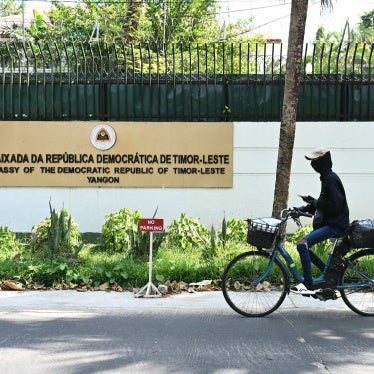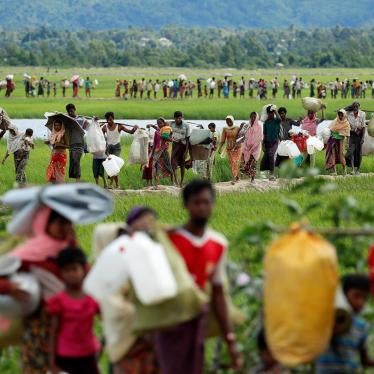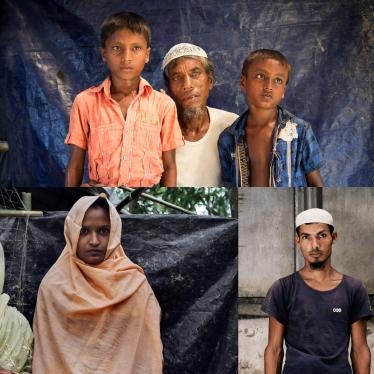(Geneva) – A new United Nations report has found that crimes against humanity are occurring in North Korea and calls for an international tribunal to investigate and hold perpetrators to account, Human Rights Watch said today.
The report, by a UN Commission of Inquiry appointed by the UN Human Rights Council in March 2013, recommends that the UN Security Council refer the situation in North Korea to the International Criminal Court (ICC) and that the UN High Commissioner for Human Rights carry out investigations. The three person commission, which was chaired by Australian jurist Michael Kirby, will formally present its findings to the Human Rights Council on or around March 17, 2014. The council will then consider a resolution to act on the commission’s recommendations.
“This shocking report should open the eyes of the UN Security Council to the atrocities that plague the people of North Korea and threaten stability in the region,” said Kenneth Roth, executive director at Human Rights Watch. “By focusing only on the nuclear threat in North Korea, the Security Council is overlooking the crimes of North Korean leaders who have overseen a brutal system of gulags, public executions, disappearances, and mass starvation.”
The commission’s report finds that crimes against humanity were committed in North Korea over a multi-decade period “pursuant to policies established at the highest level of the State,” and included “extermination, murder, enslavement, torture, imprisonment, rape, forced abortions and other sexual violence, persecution on political, religious, racial and gender grounds, forcible transfer of persons, enforced disappearance of persons and the inhumane act of knowingly causing prolonged starvation.” The report notes in particular “a systematic and widespread attack against all populations that are considered to pose a threat to the political system and leadership.”
New video features eyewitness accounts of atrocities
To coincide with the release of the commission’s report, Human Rights Watch today released a video, “North Korea: Tales from Camp Survivors,” with interviews of North Koreans who survived years of abuse while incarcerated in political prison camps (kwanliso), including systematic use of beatings, food deprivation and starvation, and public executions, to control those held there. The film includes interviews with former camp guards detailing camp administration and atrocities. Regarding these types of camps, the commission found: “The unspeakable atrocities that are being committed against inmates of the kwanliso political prison camps resemble the horrors of camps that totalitarian states established during the 20th century.”
The commission’s report also finds that crimes against humanity were committed “against starving populations” in the context of mass famines in the 1990s, through “decisions and policies taken for the purposes of sustaining the present political system, in full awareness that such decisions would exacerbate starvation and related deaths amongst much of the population.” In addition, the report finds that a widespread campaign of abductions of South Korean and Japanese citizens by North Korean agents, primarily during the 1970s and early 1980s, constitutes crimes against humanity.
“The devastating findings of this inquiry should not be ignored,” Roth said. “Since the crimes were perpetrated by state actors, only an international tribunal can properly carry out criminal investigations aimed at holding perpetrators accountable.”
Human Rights Watch urged the Human Rights Council to endorse the commission’s recommendations by adopting a strong resolution on North Korea during its March session, and task the UN Secretary General Ban Ki-moon with transmitting the report directly to the UN Security Council and General Assembly for action.
The report concludes that information it collected constitutes “reasonable grounds. . .to merit a criminal investigation by a competent national or international organ of justice,” which could include the ICC, or an ad hoc tribunal created by the UN Security Council or by the consent of UN member states.
Besides referring North Korea to the ICC, the report notes that the UN Security Council has the power to set up a special tribunal for North Korea. This would be an appropriate step since many of the crimes documented by the commission occurred before 2002, when the ICC statute came into force.Tribunals created with UN Security Council resolutions have been set up for crimes committed in Rwanda and the former Yugoslavia.
Independent of the Security Council, the report notes that the UN General Assembly could pass a resolution aimed at establishing an ad hoc tribunal operated by a set of willing countries. Such a tribunal, set up by UN member states without Security Council authorization, would lack compulsory power under the UN Charter but could carry out many of the same functions as a Security Council-authorized tribunal.
Human Rights Watch urged Security Council members to immediately invite the Commission of Inquiry to brief them on their findings, and called on other countries to support efforts to achieve accountability for crimes committed in North Korea.
“The UN was set up in the aftermath of the Second World War precisely to address this kind of massive abuse,” Roth said. “The atrocities described in this report are a profound challenge to the founding ideals of the UN and should shock the organization into bold action. The suffering and loss endured by victims demand swift and definitive action aimed at bringing those responsible to justice.”
Selected accounts from the UN Commission of Inquiry Report
A former guard in a prison for political prisoners told the commission: “Inmates in the [political prison camps] are not treated like human beings. They are never meant to be released [...] their record is permanently erased. They are supposed to die in the camp from hard labour. And we were trained to think that those inmates are enemies. So we didn’t perceive them as human beings.”
One prisoner told the commission that he was forced to dispose of over 300 bodies during his 10 years in a camp at Yodok, and described how camp authorities once bulldozed a hill that had been used to bury dead prisoners, to turn it into a corn field: “As the machines tore up the soil, scraps of human flesh reemerged from the final resting place; arms and legs and feet, some still some still stockinged, rolled in waves before the bulldozer. I was terrified. One of friends vomited. …. The guards then hollowed out a ditch and ordered a few detainees to toss in all the corpses and body parts that were visible on the surface.”
The commission found that political prison camp prisoners, which included children and even babies born to prisoners, were only be able to survive “by hunting and gathering insects, rodents and wild plants or finding ways to divert food meant for the guards and farm animals.” One prisoner, describing the effects of the deprivation of food, said: “[The] babies [had] bloated stomachs. [We] cooked snakes and mice to feed these babies and if there was a day that we were able to have a mouse, this was a special diet for us. We had to eat everything alive, every type of meat that we could find; anything that flew, that crawled on the ground. Any grass that grew in the field, we had to eat. That’s the reality of the prison camp.”
A witness, describing what the commission found to be deliberate famine in the 1990s, stated: “We would eat tree bark, and we would get the roots of the cabbage under the ground, but that was just not enough. As time passed, our grandmother and other weak people were just not able to move at all.”
Another said: “So many people died that we didn’t have enough coffins so we borrowed [traditional burial boards] to give them burials. We didn’t have any wood to even give tombstones. That’s how many people died.”








